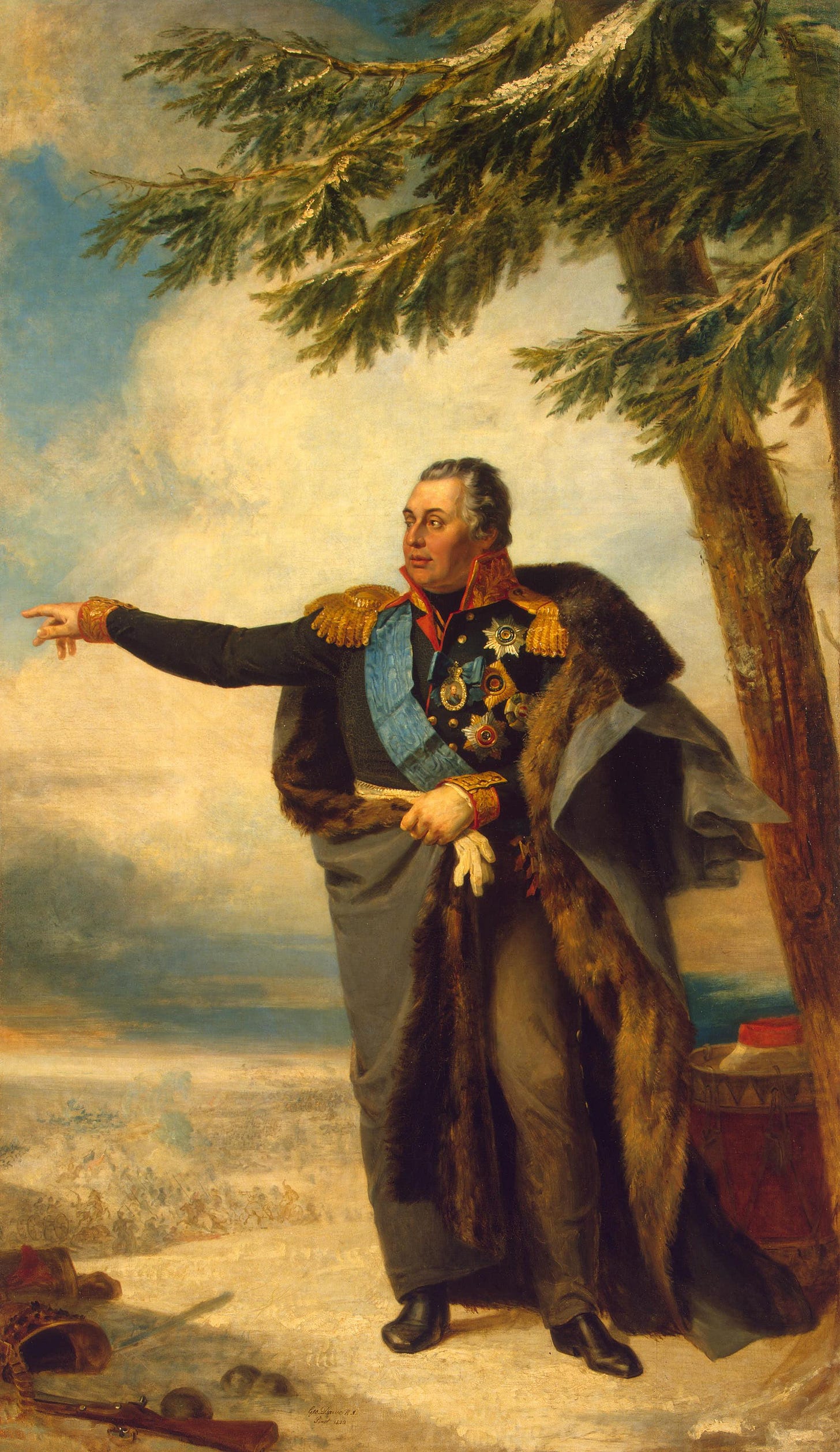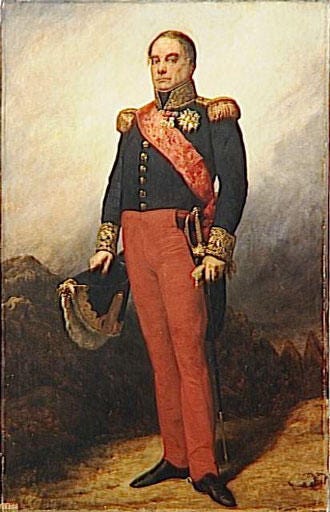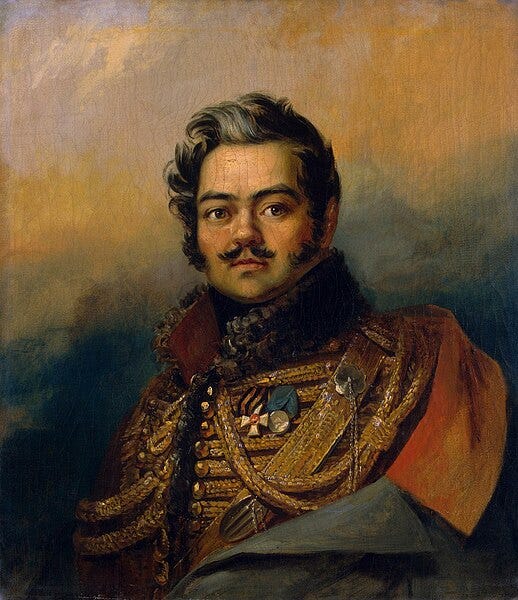Negative Numbers
War & Peace | Week 43 | Contains spoilers up to Volume 4 Book 3 Chapter 4

First thoughts
Denisov! Dolokhov! Algebra?
This week hits us hard with the best and, depending on your tastes, the worst of War and Peace.
Book 3, Chapter 2, the Maths Chapter, is going to traumatise anyone still reeling from solving quadratic equations at school. If Tolstoy, the history teacher, was too much for some, Tolstoy, the maths prof, may be the final straw.
I can imagine Tolstoy’s editor fidgetting with his buttons, saying:
Look, Leo, the algebra is nice, but I think it might not be the best bit to begin with. Let’s push it back to page 1,111. Why don’t we start with a party? Something about a bear? People love bears.
The curious thing about all this maths is Tolstoy uses it to explain that there is something intangible at play in historical events: the spirit of individuals and groups. Historians can consider the size of armies, but there is an unknown factor at play which is a greater determiner of how life plays out.
Earlier in the year, the two armies swept along the road between Smolensk and Moscow, stripping the region of food and supplies. The French are now retreating along the same road, as the weather worsens and spirits ebb. Starving, the cavalry units eat their horses and flee on foot across hostile territory.
They are facing guerrilla warfare, partisan peasants and Cossack horsemen, picking off isolated units and disappearing back into the forests.
And we shouldn't be too surprised to find Denisov and Dolokhov leading irregulars into battle. Neither of them were keen on the strict hierarchies of the organised army, both faced disciplinary action. Here they are in their element.
And so enter Petya Rostov. He's worried about the state of his trousers, bless him. This detail tells us a lot. Like his older brother at the start of the novel, he doesn't know what he is getting himself into. There is no distinction in his mind between the world of regiments and officers, and this total war that is coming.
Because the horror rising in these chapters is the cudgel. War with no limits, no end and no rules.
As Tolstoy writes, "as if there were any rules for killing people."
This post is long and may have been snipped by your email provider. I recommend viewing the full post here or in the Substack app.
Character cheat sheet
Mikhail Kutuzov The guy Tolstoy called “a simple, modest and therefore truly great figure” and Napoleon referred to as “the sly old fox from the north.” After weeks of hesitation and holding back, he turns to a darkened corner where the icons hang. “O Lord, my Creator, Thou hast heard our prayer… Russia is saved.”
Georges Mouton This sheepish soldier has a fabulous name. Tolstoy calls him a “simple-minded solider”, which conjures up the image of someone of low rank. In reality, he was a Marshal of France and a senior aide-de-camp to Napoleon. He tells the emperor’s council of war that they must retreat, a “truth which they all recognized.”
Denis Davydov This is the soldier credited with starting guerilla warfare against the French army in 1812. He wrote poetry and became something of a romantic hero for future generations. He suggested to Bagration and Kutuzov the strategy of using a small force to attack the French supply lines. If that sounds familiar, it is because one of our fictional characters had the same idea. His name is, of course:
Vasily "Vas'ka" Denisov He’s back! Someone in our reading group asked me to remind them who Denisov is since everyone seems to love him. He’s been gone for hundreds of pages. The lisping hussar was Nikolai’s superior and proposed to Natasha early in the novel. He got into a fight with his superiors, and we last saw him in a dreadful state in a military hospital, wounded and discharged from service.
Fedor Ivanovich Dolokhov If some of us need reminding of Denisov, I hope no one needs a refresher for Dolokhov. Our blue-eyed bad boy causes trouble wherever he goes. We met him drunk on a ledge, he lost a duel with Pierre of all people, and assisted Anatole Kuragin in his attempted kidnapping of Natasha. His presence right now should make us all very nervous.
Petya Rostov The youngest Rostov shouldn’t be here. He’s too young, inexperienced and keen to impress. He was a child when we first met him in the opening scenes of the novel. He’s no less a child for his military uniform. His family did everything they could to keep him away from the war. But he is following his brother’s footsteps into the heart of battle.
Discussion Questions
Maths in novels, yay or nay?
Who were you most pleased to see this week, and why was it Denisov?
Join the discussion
Let me know your thoughts in the comments. Next year, I will organise the discussion in the chat area of Footnotes and Tangents. This year, you can also connect with other readers in the group chat on Instagram and the Discord server. Let me know if you want to be added to either of these.
Choose your own adventure
Thank you for reading this Whisky and Perseverance update. Below, there is additional research, reflections and discussion for paid subscribers. These readers keep this show on the road, and I couldn’t do this without them.
Remember, you can pick and mix which
letters you want to receive by turning on and off notifications on your manage subscription page. By default, you won’t receive read-along updates unless you opt-in.Behind the paywall, I explore the forgotten story of female soldiers through history.
Keep reading with a 7-day free trial
Subscribe to Footnotes and Tangents to keep reading this post and get 7 days of free access to the full post archives.






